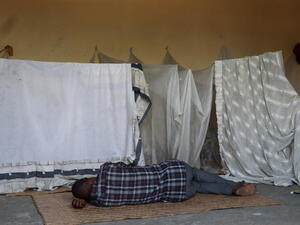Fleeing gangs, Salvadoran tailors make new life in Mexico
Fleeing gangs, Salvadoran tailors make new life in Mexico

Rafts cross the Suchiate river that divides Guatemala from Mexico, in Chiapas, Mexico. The Suchiate river is one of the main entry points for many Central American migrants that are escaping violence in their countries.
TAPACHULA, Mexico, Oct 23 (UNHCR) - Alfonso*, his wife and their three children live in just one sweltering room in southern Mexico, the large sewing machine in the middle of the floor a reminder of the livelihood they left behind when they fled gang violence in El Salvador.
Subjected to hazing, threats and attempted abduction by a murderous street gang or "mara," the industrious family of tailors from a suburb of the sprawling capital San Salvador joined nearly 30,000 Salvadorans last year who had fled for their lives according to UNHCR figures.
Alfonso recounts how his sons Luis*, 20, and Juan*, 19, became the first to seek safety in Mexico after the gang demanded they take part in their criminal activities, which range from extortion to rape and murder. They left their jobs and set out after Christmas two years ago, with the rest of the family joining them a year later.
"Every family with youngsters is a target in El Salvador," says Alfonso. "The gangs want to forcibly recruit them, and if you refuse to join, they eliminate you. If the parents oppose, they will mess with them too. That is why we had to get them out of El Salvador."
Their Central American homeland is among the most violent countries of the world, according to UN Office on Drugs and Crime figures. In August alone, 911 Salvadorans were murdered - an average of 30 per day - the highest figure ever recorded.
After an eight-hour bus trip to Tecun Uman in north-west Guatemala, Luis and Juan slipped into Mexico over the Suchiate River, an informal crossing point for smuggled goods and undocumented migrants plied by boatmen with makeshift rafts. Once in Mexico, they took a taxi that left them in downtown Tapachula, one of the principal cities in southern Mexico.
They met other Central Americans outside a church who helped them find a place to stay and work. Due to their irregular status, like other Central American migrants, they were hired for temporary jobs - unloading packages in the night shift, shelling coconuts under the sun, usually making just a few pesos and sometimes not even being paid at all.
Alfonso sent them some money to pay the rent of about US $90 per month. After a couple of weeks in Tapachula, someone at the church told them about the Mexican Commission for Assistance to Refugees (COMAR), a government office that might be able to help them.
"We were very nervous when we went to COMAR," remembers Luis. "We thought, 'What if they detain us and send us back, after all the troubles we've overcome to get here?'" They overcame their fears and finally applied for refugee status. After three months, they were officially recognised as refugees.

Juan and Luis, together with their family, fled from El Salvador escaping the increasing gang violence. The family used to have a tailoring business in El Salvador but they haven been forced to start a new life in southern Mexico.
At the family home near San Salvador meanwhile, the gangs continued their threats against them. "They said, 'We know they will be returned to El Salvador within six months, and once they are back, we will be waiting for them.'" Months went by and when there was no sign of them returning to El Salvador, the gangs switched their target: they would take out their revenge instead on Andrea*, their 15-year-old sister. Sexual and gender-based violence is common among the gangs or "maras."
Like her mother, her father and her brothers, Andrea wanted to become a tailor. She went to a state technical school for girls to learn how to sew. She was only able to attend two months of the one-year course after gang members came to the school and attempted to abduct her and another student. The school's administrators, who were also victims of the gang's violence, could only hide them in the bathrooms. When the gang left, they sent the girls home.
"I wouldn't let her go back to school. So I took her with me to work," said Claudia*, her mother. But even there she was not safe. "They told a nephew that they would take her from me … when I least expected it. Then, when they killed a friend of hers, I got even more scared, and I quit my job so I could stay home with her."
When gang members began shadowing them in the street it was the last straw. "We couldn't go to the grocery store on the corner after 4 pm. It was too dangerous. We couldn't take it anymore. So we decided to join our sons in Mexico." The three left El Salvador without letting any of their relatives know of their plans.
Once in Mexico, they applied for refugee status but they were denied asylum. Nevertheless, they were given permission to live and work in Mexico and they plan to restart their lives in their host country now that the family has been reunited.
A Salvadoran flag is pinned to the wall of their home in a city elsewhere in southern Mexico** where they now live, while a second-hand sewing machine they just bought - an icon of their family life - stands in the middle of the room. Although they worked as tailors in El Salvador, and hope to carry on stitching together a new life in Mexico, Luis and Juan are also considering carpentry.
With UNHCR support, both are retraining at an employment centre which provides asylum seekers and refugees technical training. "We are young, and we can start over. We'll work hard and we will move on. You'll see," says Luis with a hopeful smile.
* The names have been changed to protect their identity. **The location has been withheld for protection
By Mariana Echandi in Tapachula, Mexico.








